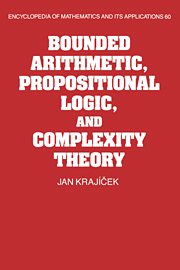Book contents
- Frontmatter
- Contents
- Preface
- Acknowledgments
- 1 Introduction
- 2 Preliminaries
- 3 Basic complexity theory
- 4 Basic propositional logic
- 5 Basic bounded arithmetic
- 6 Definability of computations
- 7 Witnessing theorems
- 8 Definability and witnessing in second order theories
- 9 Translations of arithmetic formulas
- 10 Finite axiomatizability problem
- 11 Direct independence proofs
- 12 Bounds for constant-depth Frege systems
- 13 Bounds for Frege and extended Frege systems
- 14 Hard tautologies and optimal proof systems
- 15 Strength of bounded arithmetic
- References
- Subject index
- Name index
- Symbol index
8 - Definability and witnessing in second order theories
Published online by Cambridge University Press: 02 December 2009
- Frontmatter
- Contents
- Preface
- Acknowledgments
- 1 Introduction
- 2 Preliminaries
- 3 Basic complexity theory
- 4 Basic propositional logic
- 5 Basic bounded arithmetic
- 6 Definability of computations
- 7 Witnessing theorems
- 8 Definability and witnessing in second order theories
- 9 Translations of arithmetic formulas
- 10 Finite axiomatizability problem
- 11 Direct independence proofs
- 12 Bounds for constant-depth Frege systems
- 13 Bounds for Frege and extended Frege systems
- 14 Hard tautologies and optimal proof systems
- 15 Strength of bounded arithmetic
- References
- Subject index
- Name index
- Symbol index
Summary
This chapter is devoted primarily to proving several definability and witnessing theorems for the second order system and analogous to those in Chapters 6 and 7.
Our tool is the RSUV isomorphism (Theorem 5.5.13), or rather the definition of (Definition 5.5.3), together with the model-theoretic construction of Lemma 5.5.4.
The first section discusses and defines the second order computations. In the second section are proved some definability and witnessing theorems for the second order systems and further conservation results for first order theories (Corollaries 8.2.5-8.2.7). The proofs are sketched and the details of the RSUV isomorphism arguments are left to the reader.
Second order computations
Let A (a, βt(b)) be a second order bounded formula and (K, X) a model of. By Definition 5.5.3 we may think of K as of K = Log(M) for some M ⊨, with X being the subsets of K coded in M. Pick some a, b ∈ K of length n and some βt(b). Then
if and only if (see Theorem 5.5.13 for the notation)
where u codes βt(b) The length of u is thus.
Information
- Type
- Chapter
- Information
- Bounded Arithmetic, Propositional Logic and Complexity Theory , pp. 132 - 138Publisher: Cambridge University PressPrint publication year: 1995
